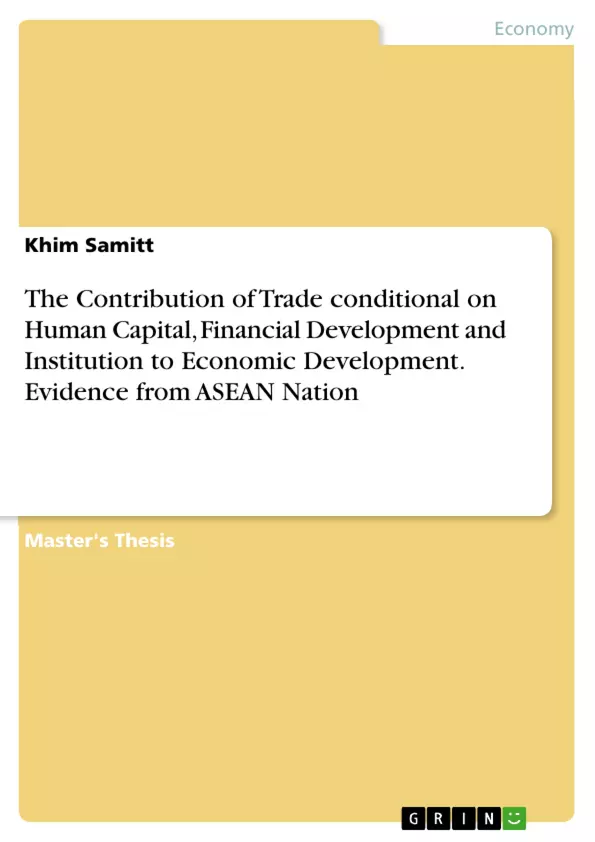This thesis addresses the relationship between economic development and trade
openness as well as some structural factors (i.e., human capital, financial resources and
institution) in the ASEAN countries. This thesis has three objectives. First, it attempts to
qualitatively describe the ASEAN cooperation in order to promote interest in ASEAN.
Second, it quantitatively estimates the effect of international trade on economic development
of the ASEAN nations. Finally, it investigates how the effect of international trade on
economic growth varies as a result of differences in human capital, financial resources and
institution across the ASEAN nations.
To accomplish these tasks, panel dataset on the ASEAN nations from 1980 to 2010
are collected and pooled OLS, fixed-effect and instrumental variable models are applied to
the dataset. Taking into account a variety of specification issues as well as endogeneity of
trade openness, the research results show that trade openness plays an extremely important
role on economic development of these countries. In addition, the benefit from trade
openness is greater in countries that have more educated workers, deeper financial resources
and better quality of institution. In conclusion, this thesis suggests that these structural factors
need to be strengthened in order to benefit more from international trade.
Key words: International trade; human capital; financial development; institution; ASEAN;
fixed effect; instrumental variable; policy reforms
Inhaltsverzeichnis (Table of Contents)
- CHAPTER ONE: INTRODUCTION
- 1.1. Research Backgrounds
- 1.1.1 Economic Cooperation in ASEAN
- 1.1.1.1. ASEAN Free Trade Area (AFTA)
- 1.1.1.2 The ASEAN Economic Community (AEC)
- 1.2. Research Motivations
- 1.3. Research Objectives and Intended Contribution
- 1.4. Thesis Structure
- CHAPTER TWO: LITERATURE REVIEW
- 2.1. The Effects of Foreign trade on Economic Development
- 2.2. The Effects of Institutions on Foreign trade and Economic Development
- 2.3. The Effects of Financial Development on Trade and Economic Development
- 2.4. The Effects of Human Capital on Foreign trade and Economic Development
- CHAPTER THREE: THEORETICAL FRAMEWORK
- 3.1. Foundations of Trade Theories
- 3.2. Why Do Nations Trade? Is trade good for a country?
- 3.3 Theories of complementary factors to trade openness and growth
- 3.4 Human Capital in the Theoretical Perspectives
- 3.5 Institutions in the Theoretical Perspectives
- 3.6 Financial Development in the Theoretical Debates
- 3.7 An Illustration of an Endogenous Growth Model
- 3.8 Proposed Research Hypothesis
Zielsetzung und Themenschwerpunkte (Objectives and Key Themes)
This thesis aims to explore the relationship between economic development and trade openness, considering the influence of structural factors like human capital, financial resources, and institutional quality in ASEAN nations. The research focuses on three key objectives:- Provide a qualitative description of ASEAN cooperation to stimulate interest in the region.
- Quantitatively assess the impact of international trade on the economic development of ASEAN countries.
- Investigate how differences in human capital, financial resources, and institutional quality across ASEAN nations affect the relationship between international trade and economic growth.
Zusammenfassung der Kapitel (Chapter Summaries)
The first chapter introduces the research background, motivations, objectives, and structure of the thesis. It provides an overview of economic cooperation within ASEAN, highlighting the ASEAN Free Trade Area (AFTA) and the ASEAN Economic Community (AEC). Chapter two delves into the literature review, examining the effects of foreign trade on economic development, the role of institutions in promoting foreign trade and economic growth, the influence of financial development on trade and economic development, and the impact of human capital on foreign trade and economic development. The theoretical framework outlined in chapter three explores the foundations of trade theories, investigates the reasons behind international trade, and examines complementary factors that contribute to trade openness and economic growth. The chapter further analyzes the theoretical perspectives on human capital, institutions, and financial development, providing an illustration of an endogenous growth model and presenting the proposed research hypothesis.Schlüsselwörter (Keywords)
This thesis focuses on the relationship between international trade and economic development within ASEAN nations. Key concepts include trade openness, human capital, financial development, institutional quality, economic growth, panel data analysis, and policy reforms. The research utilizes econometric methods like pooled OLS, fixed-effect models, and instrumental variables to analyze the data.Frequently Asked Questions
What is the main objective of this thesis?
The thesis investigates the relationship between trade openness and economic development in ASEAN nations, specifically looking at the influence of human capital, financial development, and institutions.
How does human capital affect the benefits of trade?
The research shows that countries with more educated workers (higher human capital) tend to gain more from international trade openness.
What role do institutions play in economic growth?
Better quality of institutions is identified as a key structural factor that strengthens the positive impact of trade on a nation's economic development.
Which ASEAN economic initiatives are discussed?
The thesis highlights the ASEAN Free Trade Area (AFTA) and the ASEAN Economic Community (AEC) as central frameworks for regional cooperation.
What methodology was used for the quantitative analysis?
The study utilized panel datasets from 1980 to 2010, applying pooled OLS, fixed-effect, and instrumental variable models.
- Quote paper
- Khim Samitt (Author), 2013, The Contribution of Trade conditional on Human Capital, Financial Development and Institution to Economic Development. Evidence from ASEAN Nation, Munich, GRIN Verlag, https://www.grin.com/document/281848



